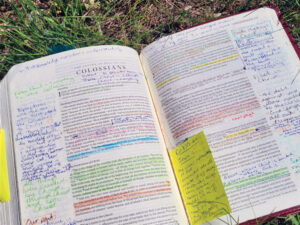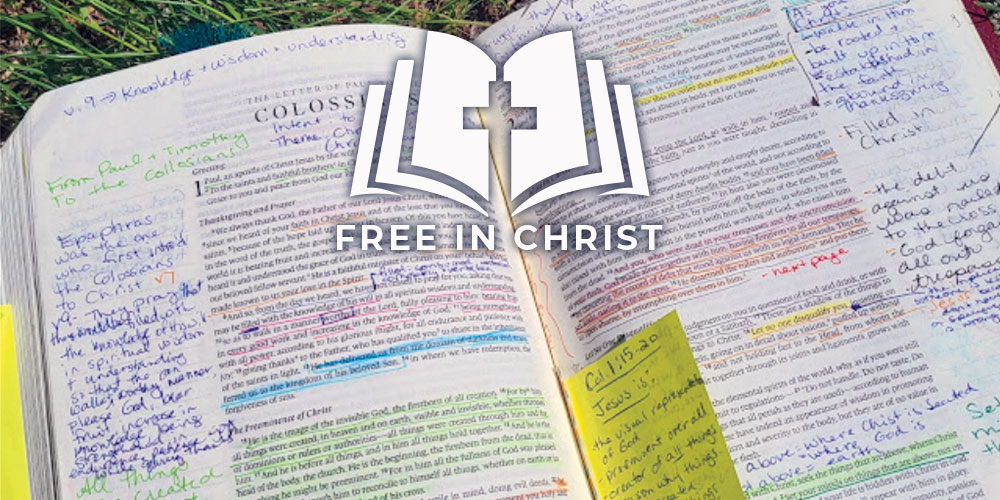 |
“Grow in the grace and knowledge of our Lord and Savior Jesus Christ” (2 Peter 3:18). Read how these Christians carry out that instruction in their lives.
In the days of working full time, I often pictured myself, as I’m sure people in many walks of life have, like an octopus with each arm continuously fully employed. If I slowed or—heaven forbid—sat down, I was asleep. However, as an educator, I could look forward to a change of pace come May. Knowing this modification was ahead, I pushed through to the end of the school year with every ounce of energy I could muster—in other words, I ended up thoroughly exhausted.
Then came the day when friends offered their cottage for anyone on staff to use. The idea of total isolation possessed me! Four days of talking to no one—except to God through prayer and God to me through his Word—seemed like heaven on earth. I booked it.
I packed a duffel bag with a minimum of supplies and a cooler like I was leaving civilization—which was definitely the plan. I also took my Bible, a blank notebook, and maybe a novel.
A typical response I received from others when it became known I was headed on retreat was, “But you live alone! Why would you go away by yourself?” In addition, my typical day already began with devotion, prayer, and journaling.
Was it the amenities? It was more about the lack of. No TV or phone service?! I savored time without deadlines, appointments on the calendar, or a tote bag of planning and paperwork. One similarity was the pot of coffee that kick-started the morning. As it turned out, sitting in my pajamas for much of the day was good for me too.
I began by alternately reading my Bible and writing thoughts as they came—sorting, sifting, and ponder-ing—letting the Word of God seep in. Prayer flowed from my heart into my notebook and to the throne of God. Sometimes a theme emerged or a Bible study book would guide me. Often, I found it was past noon when I came up for air. Glorious.

I included a long walk every day, and one year I allowed myself a dinner out. If the cabin happened to be on a lake, I’d embrace my fishing pole, dropping the line in the water at the end of the pier or over the side of the canoe. Later, I would return to the Word of God, picking up where I left off.
After the first experience, I never missed a year. The location changed, but the retreat became tradition. Sometimes I headed to the last day of school with my car packed, pointed north for noon dismissal.
I have moved forward beyond my 30-year career to days full of projects and business opportunities, days with greater flexibility than heading out the door before 7 A.M. I am privileged to experience and treasure leisurely mornings around Scripture—in my pajamas more often than not. I’ve read and scribbled my way through a plethora of Bible studies, with stacks waiting their turn. There, the Holy Spirit does his work of calming and shaping my days. Always and still, glorious.
Jane Schlenvogt-Dew
One of my earliest memories about technology involves bidding on and winning an Apple IIe at a local auction. As a third grader, that $3 bid granted me the opportunity to play Lemonade Stand and Oregon Trail with too much regularity. Today, instead of desktop workstations with green screens, we have phones with high density displays and an always-on connection to the Internet, providing high-quality Bible translations at our fingertips.
These advances have both limited excuses and expanded access to nearly limitless personal Bible study resources. Personally, I use the free YouVersion Bible app to gain easy access to many Bible translations, including the New International Version, English Standard Version, and Christian Standard Bible. More interesting than simply having translations available, the app even allows viewing two at once.
A simple Bible app on my phone has helped me embed daily Bible study in my life.
However, I have found the “plans” feature to be the most powerful. Subscribing to a plan allows me to track my progress on topical devotional material as well as Bible read-throughs. The app’s built-in dictation feature enables me to listen to a devotion or Bible reading while I am working on other things around the house or office.

On mobile devices, the Bible app allows for plans to be shared with friends, enabling all who join to follow the progress of one another and reflect on the material being read and studied. I have used this specific feature to stay connected with both my Christian brothers in my area and my older sons.
Connecting with fellow brothers, especially while we are busy, has been a long-term goal. While no substitute for gathering together, these plans allow us to share a little bit of time around the Word of God when it works for each of us individually. In the past, we would not have connected at all. The hope is to leverage these short-term engagements and gather when finishing a plan together.
Maybe more importantly, I am able to connect with my older sons even as our family’s life gets busier. Our shared plans allow me to check in to see how they are doing and probe, ever so gently, about what is sitting on their hearts. These shared plans also provide me an opportunity to model the godly use of technology in a world awash in sinful examples.
Technology is not, and can never be, our Savior. Christ came into this world and saved us from our sins. However, the devil, the world, and our own sinful flesh continue to do all they can to keep us away from connecting with God’s Word and one another. For me, a simple Bible app on my phone has helped me embed daily Bible study in my life as well as given me the opportunity for greater connection with those around me. I am thankful that God has graciously chosen to work through our fallen human means to bring and keep us closer to him.
Robert Martens
How to study your Bible
Dr. Siegbert Becker (1914–1984), a prolific writer, was a Wisconsin Lutheran Seminary professor from 1969 to 1984. He wrote an essay sharing timeless ideas on how you can study your Bible. Below are excerpts from his paper:
- If we would treat the most interesting detective story as we treat our Bibles and read a page or two a day, it would be rather difficult to sustain interest for very long. We ought to form the habit of reading longer sections, if not whole books.
- Some people have a distaste for marking up their Bibles, but there is no reason why we ought not to underline the passages which have special meaning for us. Underlining them will help to fix them in our memory; it will enable us to find these passages with greater ease when we want to use them again.
- It would be of value to fill up the margins with anything that you feel might be of value to you. One of the Bibles that I use has an “M” in the margin wherever a miracle is found, a “P” next to every general prophecy, a cross next to every Messianic prophecy, and “FP” wherever the fulfillment of a prophecy is referred to.
- It is a good thing whenever you sit down to read the Bible to read purposefully. A book in the Bible may be read over and over again dozens of times, without losing its appeal if each time we read it we look for something specific. I may read a book through once just to see how many passages I can find to prove and to illustrate the doctrines of the catechism. I may read the same book to see what the author has to say about the Savior. At another time the book may be perused to discover what the author has to say about the times and the people among whom he lived. At another time special attention may be paid to the social and economic conditions which prevailed. At still another time the reader may look particularly for passages of comfort and encouragement.
- Every time we read we ought to keep in mind what we might learn for our own faith and our own life.
Other ways to study your Bible
Write it down

Try journaling. Whether it’s copying a section of Scripture, drawing your interpretation, or creating digital art- work, each option can help cement that portion of Scripture in your head and heart.
Want to try it but not sure how to start? A Facebook group, facebook.com/groups/writeitdown.wels, offers daily writing prompts from Scripture.
Reading programs
Do you feel intimidated by reading the Bible? Bible reading programs like “Through my Bible in Three Years” (wels.net/bible) or Bibles like the One-Year Chronological Bible offer a daily schedule to help you get into the habit.
Northwestern Publishing House (NPH) also has launched a reading challenge. The Story of God’s Love is a condensed Bible that summarizes the whole plan of God’s salvation for people from Eden to eternity. Every Monday, NPH will post a weekly reading guide for the book—including devotional questions.
Read more> at blog.nph.net/storychallenge.
Author: Multiple authors
Volume 111, Number 02
Issue: February 2024
- Free in Christ: Youth confirmation practices
- Free in Christ: Community outreach
- Free in Christ: Personal witnessing
- Free in Christ: Personal Bible study
- Free in Christ: Congregational Bible studies








